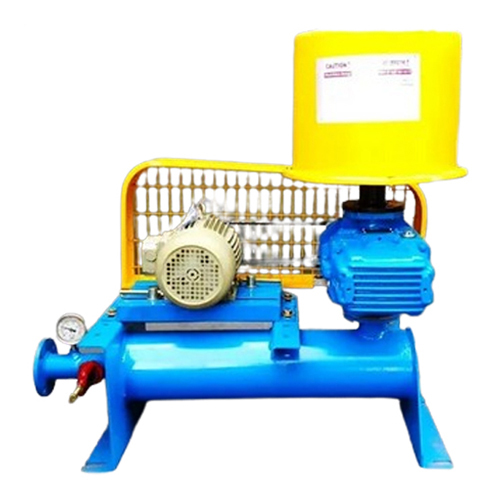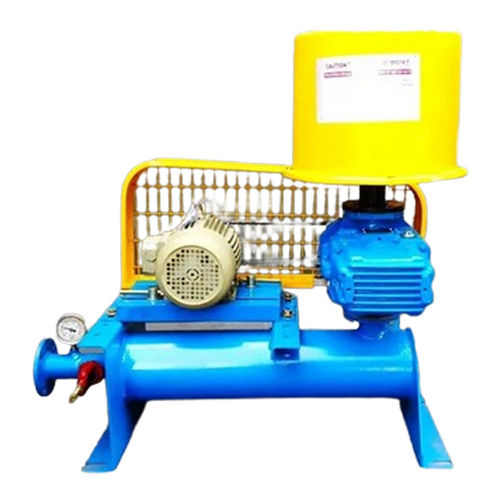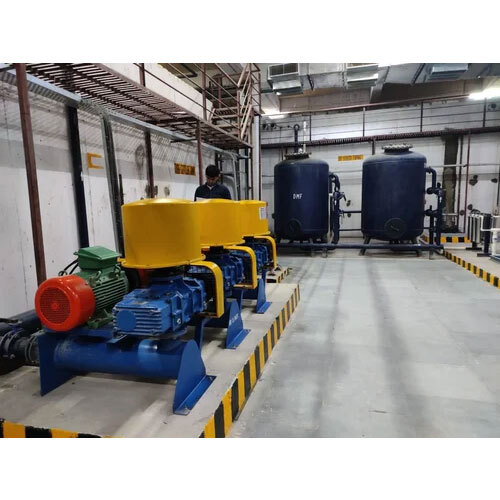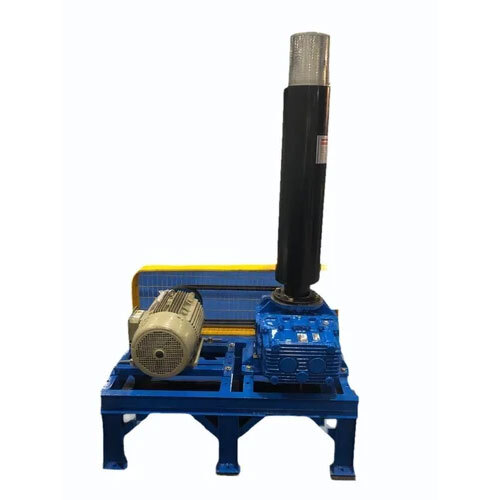Bulker Blower
Price 50000.0 INR/ Unit
Bulker Blower Specification
- Usage
- Industrial
- Material
- MS
- Structure
- Screw Pump
- Size
- Standard
- Power
- Electric
- Product Type
- Bulker Blower
- Fuel Type
- Diesel
- Pressure
- Medium Pressure
- Color
- Blue
Bulker Blower Trade Information
- Minimum Order Quantity
- 1 Unit
- Payment Terms
- Cash Advance (CA), Cash in Advance (CID)
- Supply Ability
- 100 Units Per Month
- Delivery Time
- 2 Week
- Sample Available
- No
- Sample Policy
- Contact us for information regarding our sample policy
- Main Domestic Market
- All India
About Bulker Blower
A Bulker Blower, also known as a bulk material blower, is a type of positive displacement blower used primarily in the pneumatic conveying of bulk materials such as powders, grains, granules, or other loose, dry substances. These blowers are typically used in industries such as cement, chemical processing, food production, pharmaceuticals, and mining, where bulk materials need to be transported over distances or between different stages of processing.
The Bulker Blower is specifically designed for conveying bulk materials in a vacuum or pressure conveying system. It is typically used in vacuum conveying systems to move materials from trucks or silos to storage bins or processing equipment, but can also be used in pressure conveying systems.
Key Features of a Bulker Blower:
-
Positive Displacement Design:
- Similar to other positive displacement blowers, a Bulker Blower operates by trapping a fixed volume of air and displacing it through the system, providing a constant flow of air. This helps in the effective transportation of bulk materials in a pipeline or pneumatic system.
-
High Airflow Capacity:
- Bulker blowers are designed to generate high volumes of airflow (often measured in cubic feet per minute or CFM), which is essential for moving bulk materials over long distances or through long pipelines.
-
Pressure and Vacuum Capabilities:
- Depending on the application, Bulker Blowers can be configured to work in either a vacuum conveying system (for suction) or a pressure conveying system (for pushing material). This makes them versatile for a wide range of bulk material handling needs.
-
Two Types of Conveying:
- Pressure Conveying: The blower generates high pressure, pushing materials through a pipeline to a designated area (e.g., from a silo to a packaging machine).
- Vacuum Conveying: The blower generates low pressure (vacuum), pulling materials through a pipeline from a source (e.g., from a truck to a silo or storage container).
-
Durability and Robustness:
- Bulker blowers are built to withstand the stresses of transporting abrasive or coarse materials, and they are designed with durable materials like cast iron or steel. They are intended to work in harsh environments, withstanding wear and tear from the abrasive nature of some bulk materials.
-
Low Maintenance:
- Many Bulker Blowers have fewer moving parts compared to other types of compressors or blowers, which means they generally require less maintenance. Regular inspection of seals, bearings, and rotors, however, is still important to maintain performance.
-
Compact Design:
- These blowers are often compact and efficient, allowing them to fit into smaller spaces while still providing the necessary airflow for material handling operations.
Working Principle of a Bulker Blower:
The basic principle behind the operation of a Bulker Blower is similar to other types of positive displacement blowers (like Roots blowers), where air is trapped and displaced by rotating lobes or rotors inside the blower.
-
Suction or Pressure Generation:
- Depending on the system design, the blower either creates suction (vacuum) to draw material through pipes or provides positive pressure to push material through the system.
-
Pneumatic Conveying:
- The material (such as cement, flour, granules, or pellets) is moved through a pipeline or hose by the air generated by the blower. In a vacuum conveying system, the material is drawn into the pipeline, while in a pressure conveying system, the material is pushed through the pipeline toward its destination.
-
Material Delivery:
- The material reaches its final destination, such as a silo, storage container, processing machine, or packaging line. The airflow helps ensure that the material is moved efficiently and without significant degradation.
Applications of Bulker Blowers:
Bulker Blowers are widely used in industries where bulk materials need to be transported efficiently through pipes or hoses. Common applications include:
-
Cement and Construction:
- Bulker blowers are often used to discharge bulk cement from trucks or tankers into storage silos at construction sites or cement plants. The blower helps transfer the material over long distances from the truck to the silo, either under pressure or via vacuum.
-
Food Processing:
- In food plants, Bulker Blowers are used to convey bulk ingredients like flour, sugar, powdered milk, and spices into storage bins or processing equipment. They are especially useful for conveying powders without contaminating the material.
-
Pharmaceuticals:
- Bulker blowers are used to convey pharmaceutical powders or granules in a clean, controlled environment. For example, they can be used to transport active pharmaceutical ingredients (APIs) or excipients between different areas of a pharmaceutical facility.
-
Chemical Industry:
- Similar to the food industry, chemicals in bulk, such as plastics pellets, powdered chemicals, and fertilizers, are conveyed efficiently by Bulker Blowers. This helps avoid contamination and ensures a smooth transfer of materials.
-
Plastic Industry:
- In the plastic industry, blowers are used to convey plastic pellets from silos to extruders or packaging machines. Bulker blowers help avoid blockages and ensure smooth flow of the material.
-
Mining:
- In mining operations, Bulker Blowers may be used to transport fine ore or coal powders via pneumatic systems.
-
Powder Coating:
- The powder coating industry uses Bulker Blowers to convey coating powders from storage silos to spray systems.
-
Grain and Agriculture:
- Bulker blowers are used to transport grains, seeds, and other dry agricultural products from silos to storage or packaging systems.
Advantages of Bulker Blowers:
-
High Airflow Capacity: Bulker blowers are designed to handle high volumes of air, which is essential for moving large quantities of bulk material over long distances or high elevations.
-
Efficient Handling of Bulk Materials: They offer a safe, efficient, and dust-free way to transport bulk materials, reducing labor and handling costs.
-
Low Maintenance: With relatively few moving parts, these blowers require less frequent maintenance and have a longer operational lifespan.
-
Adaptability: Bulker blowers are versatile and can be used for both vacuum and pressure conveying, making them suitable for a wide range of industries and applications.
-
Minimized Contamination: The enclosed nature of pneumatic conveying systems helps reduce the risk of contamination, making them ideal for industries like food processing and pharmaceuticals.
Energy Efficiency: Since they use air to transport materials, these blowers can be more energy-efficient compared to traditional mechanical methods of material handling.
| Blower Type | Roots Blower |
| Color | Green |
| Fan Speed | 1500 |


Price:
- 50
- 100
- 200
- 250
- 500
- 1000+
More Products in Roots Blower Category
Roots Blower
Price 50000.00 INR / Piece
Minimum Order Quantity : 2 Pieces
Color : Blue
Usage : Water, Oil Well, Air Pump, Food, Boat, Water Well, Automobile, Paper Printer, Other
Size : Standard
Material : MS
Blower for STP
Price 40000.0 INR / Unit
Minimum Order Quantity : 1 Unit
Color : Blue
Usage : Water, Water Well, Automobile
Size : Standard
Material : MS
Roots Blower
Price 55000 INR / Piece
Minimum Order Quantity : 1 Piece
Color : Blue
Usage : Other
Size : Standard
Material : Cast Iron
Twin Lobe Roots Blower
Price 90000 INR / Piece
Minimum Order Quantity : 1 Piece
Color : Black And Blue
Usage : Other
Size : Standard
Material : Cast Iron

 Send Inquiry
Send Inquiry






 Send Inquiry
Send Inquiry Send SMS
Send SMS